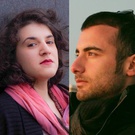
Giulia Lorusso et Alessandro Rudi
Biographies
Giulia Lorusso étudie le piano puis la composition avec Alessandro Solbiati au Conservatoire de Milan où elle obtient sa licence en 2014. En 2015, elle étudie l'orchestration et l'analyse avec Allain Gaussin puis elle suit le Cursus de composition et d’informatique musicale de l'Ircam. La même année, elle intègre le Conservatoire national supérieur de musique et de danse de Paris en Master dans la classe de composition de Frédéric Durieux, et les classes de composition électroacoustique de Yan Maresz et Luis Naón. Sa musique a été jouée par le Quartetto Prometeo, l’Ensemble Nikel, le Divertimento Ensemble, l’Orchestre Philharmonique de Bruxelles et les solistes de l’Ensemble intercontemporain. Elle est programmée dans plusieurs festivals, comme le Festival Milano Musica, Festival Manifeste- Ircam, Tzlil Meudcan Festival (Tel Aviv), Bludenzer Tage zeitgemäßer Musik, Forum Tactus for young composers (Bruxelles).
Alessandro Rudi est chercheur à l’ INRIA et à l’École Normale Supérieure de Paris. Il a soutenu sa thèse de doctorat en 2014 à l’Université Gênes, après avoir été étudiant invité au Center for Biological and Computational Learning du MIT (Massachusetts Institute of Technology) de Boston. Entre le 2014 et le 2017 il a été boursier postdoctoral auprès du Laboratoire d’Apprentissage Informatique et Statistique (Laboratory of Computational and Statistical Learning) de l’Institut Italien de Technologie de l’Université de Gênes.
Résidence en recherche artistique 2019.20
Entre interaction et génération : nouvelles perspectives dans le domaine des environnements sonores génératifs via “la prédiction de structures localisées".
En collaboration avec l'équipe Représentations Musicales de l'Ircam-STMS et ZKM.
En exploitant l’état de l’art en matière de descripteurs du signal audio ainsi que les dernières évolutions des modèles génératifs pour la prediction structurée et le deep learning, ce projet de recherche vise à s’interroger sur des questions inhérentes à la créativité computationelle, avec pour objectif l’exploration et l’étude d’une partie des infinies possibilités d’application des technologies dans le domaines de la génération de musique.
Plus précisément, la présente recherche se concentre sur l’intégration des techniques d’analyse et reconnaissance des sons environnementaux avec les derniers modèles génératifs d’apprentissage automatique (generative machine learning models) en vue de produire un système capable de reconnaître, sur la base d’un large corpus d’ échantillons sélectionnés selon des critères spécifiques, les patterns emergents des données audio en entrée et les transfigurer de façon inattendue. La finalité de cette recherche est d’offrir des nouvelles perspectives d’interaction entre les systèmes sonores générées par ordinateur et l’environnement, avec le potentiel des feedbacks positifs, “créatifs” et cohérents.
La recherche se consacrera aux aspects fondamentaux suivants :
- reconnaissance et analyse des sons d’environnements
- classification audio appliquée à des scènes sonores complexes
- modélisation des caractéristiques audio des sons environnementaux
- machine learning pour structured data en large échelle
- encadrement génératif à travers les techniques de structured prediction qui exploitent la structure locale des données.


